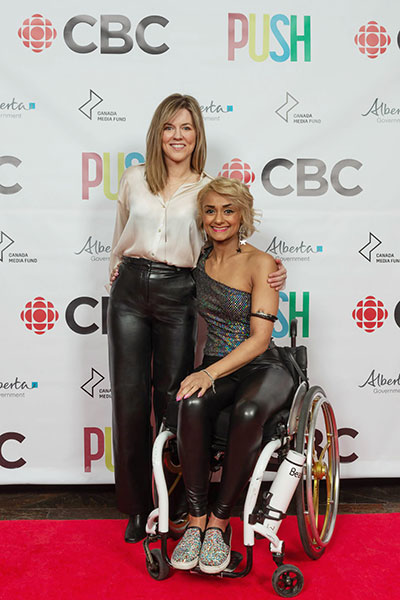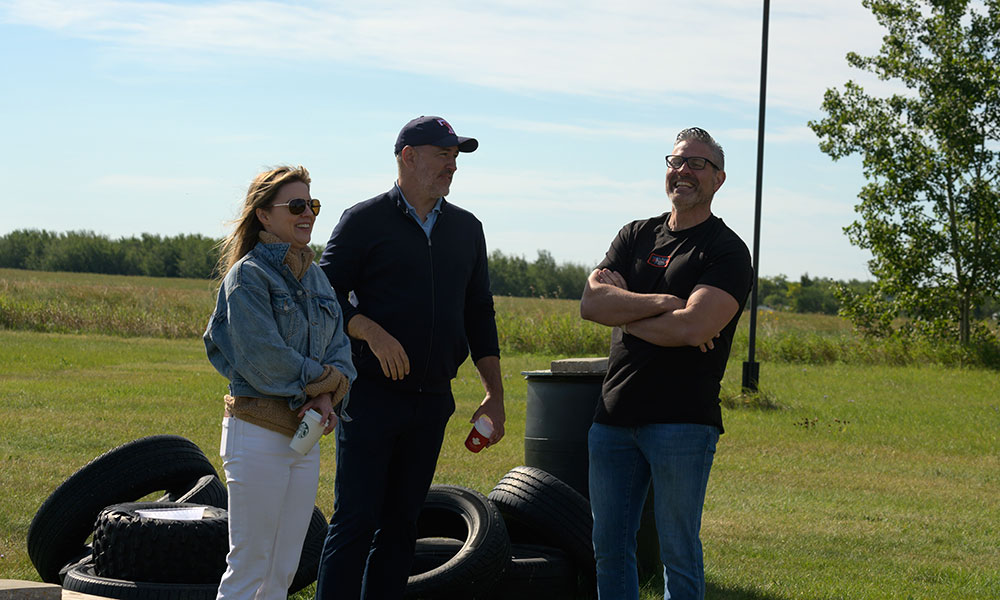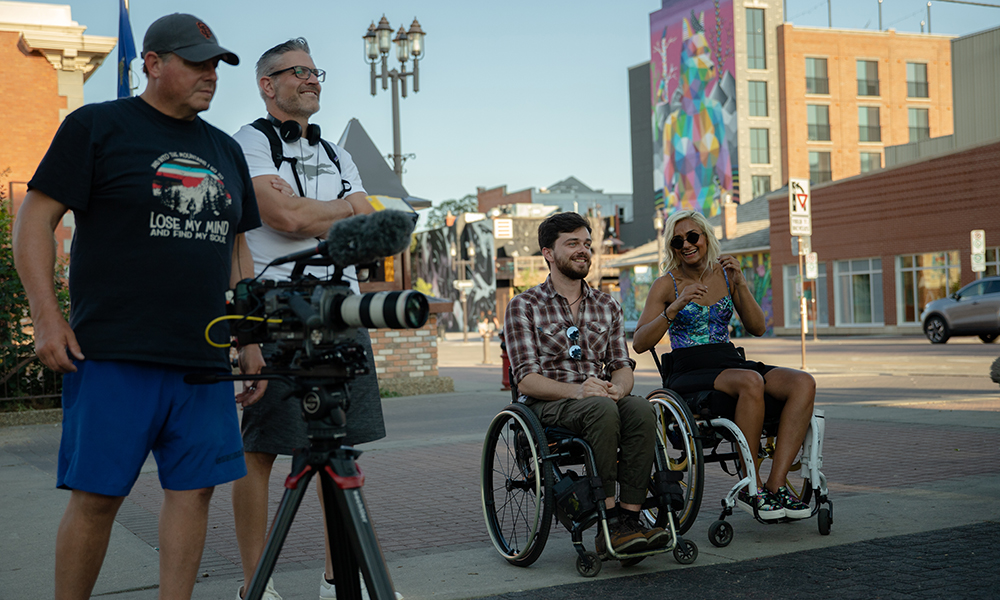"I thought, We’ve got to move on this quickly"
When asked what, exactly, a film and television producer does all day, Kaitlan Stewart can’t help but laugh.
“Oh boy,” she says. “Sometimes I wonder what I do as well.”
Stewart (Radio and Television – TV ’13) is laughing not because the job is too simple, but rather because it’s a never-ending series of ever-changing tasks – everything from finding stories to pitching broadcasters to hiring crew to securing funding (often multiple streams of it).
When all of the above goes right, however, producers can end up with a compelling final product. That’s certainly the case for Stewart and her production company, Fenix Film & Television, which she founded in 2019. Fenix’s first big project, the docuseries Push, is currently in its eight-episode run on CBC TV and CBC Gem (with a bonus ninth episode airing exclusively on the network’s online Gem platform).
Push tells the story of Edmonton woman Bean Gill and her group of friends, who all use wheelchairs and lovingly call themselves “the wheelie peeps.” Stewart believes it is the first primetime show in Canada to have an entire leading cast with disabilities, and she made a point of also hiring crew members with disabilities, as well as using an accessibility coordinator and disability strategy consultant.
She spoke with techlifetoday about breaking into the industry, how Push moved from coffee-shop idea to national TV show, and where the show might take her next.
Techlifetoday: How did you get into this line of work?
 Kaitlan Stewart: Edmonton is a smaller market, so you do what you need to do to get experience.
Kaitlan Stewart: Edmonton is a smaller market, so you do what you need to do to get experience.
There were a few larger companies in operation when I graduated, but they’ve all since left, sadly.
I started as an office assistant at a company that did unscripted television, and ended up working for all three of those major production companies, always on the producing side.
My last role was with Mosaic Entertainment, where I took over their business affairs and development.
For anyone who wants to make their own projects and understand how they come together, business affairs is maybe the most tedious job, but also the most important.
It’s how all the funding comes together. Without that experience, I don’t think I could have started my own company.
How did you first meet Bean Gill and start developing the project that would become Push?
Bean (Medical Radiologic Technology ’03) was featured in Edify magazine’s Top 40 Under 40 [in 2019]. She looked like an incredible person who had a lot to say, so I emailed her and asked if she would like to meet for coffee.
From the very beginning, she was completely onboard and said yes to everything I’ve ever asked her. My company was newer, but the level of trust she had in me to take her story and make it into something was heartwarming. I knew there was something there.
What attracted to you to her story in particular?
That first coffee with Bean was my introduction to [thinking about disability]. I admit, I was an ignorant, able-bodied person who hadn’t given it a lot of thought.
The level of trust she had in me to take her story and make it into something was heartwarming.
I was shocked, the amount of times I thought, I’ve never thought of that. There is so much ignorance about it, both in thinking that their lives are just about their disability, and in not understanding the actual challenges they face on a daily basis.
Bean is a consulting producer on the show, and we engaged with people with disabilities at every level. There are so many pitfalls in disabled storytelling that perpetuate stereotypes – unintentionally, I think, but it’s still there. So you have to have the right people in place so the stories can be told responsibly and authentically.
How does the pitching process for the project go, and how did it compare to how it normally goes?

We only pitched CBC, which is rare. I had seen a presentation at a conference where the CBC had specifically mentioned they were looking for projects in the disability space. So I thought, We’ve got to move on this quickly.
I think it’s only 1% of pitches that go into development, and 10% of projects in development that actually go into production. So that gives a sense of how the cards are stacked against you.
Our initial pitch outlined what we thought the show was, and the people we had involved. Then, when we went into formal development, we went out and shot a demo reel with the participants. Then you do a full written pitch deck, which involves descriptions of the characters, episodes synopses, and a style guide for the show. From there we had to do a full pitch to, I think, 10 CBC executives, where we verbally pitched the project.
They came back with a few other questions, but it was minimal, and mostly about budget. Once you start talking about budget, you’re in pretty good shape.
Why do you think the CBC responded to the idea so strongly?
I think they responded to the participants. I’d love to take credit for finding all of these amazing people, but really they’re just Bean’s friends. They’re truly authentic, honest, real people. They have completely different backgrounds, and their disabilities are also on a spectrum, in terms of how they present and their experience with them.
During our initial pitch the CBC thanked us for the authenticity of the cast, and not meddling with it – trying to manufacture something that wasn’t there.
Now that the show is complete, what does it mean to you have to it out there, both personally and professionally?

I can’t quite wrap my head around it, to be honest. I’m hearing a lot of really positive feedback. After our premiere, I heard from a woman whose 12-year-old daughter is in a wheelchair. She couldn’t believe there were this many wheelchairs in one show.
I always wanted to make a show that made a difference. I didn’t want to make The Real Housewives of Edmonton. I don’t think we know the full impact yet, but I’m really proud.
Do you have any idea what your next project will be?
We’re in discussions about season two for Push. We’re currently in formal development, so not a green light just yet. But more happy conversations.
Season 2 on its way
Season 1 of Push proved such a success that CBC gave the green light for a fresh batch of episodes. Watch for Season 2 in winter 2024 on CBC and CBC Gem.